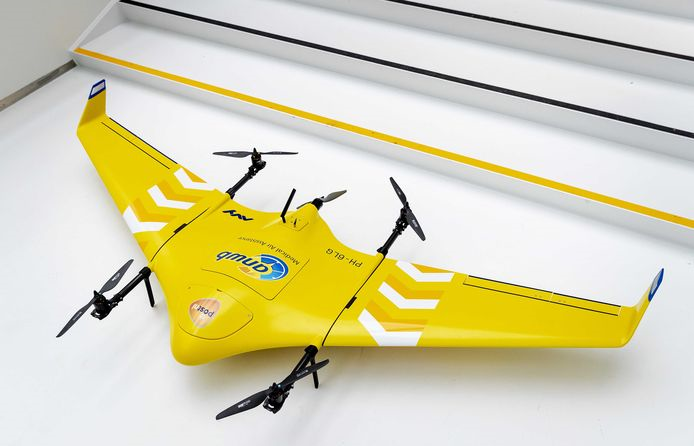PRE2020 3 Group 5 State of the Art: Difference between revisions
| Line 13: | Line 13: | ||
An example of a technical challenge that this drone faces is to maintain a certain temperature, as blood has for instance ideal temperatures at which it should be transported. In addition, it doesn’t fly at bad weather conditions. | An example of a technical challenge that this drone faces is to maintain a certain temperature, as blood has for instance ideal temperatures at which it should be transported. In addition, it doesn’t fly at bad weather conditions. | ||
[[File:ANWB drone.png|1000px|Image: | [[File:ANWB drone.png|1000px|Image: 500 pixels|center|thumb|Pilot drone .]] | ||
==Test== | ==Test== | ||
Revision as of 19:14, 3 March 2021
Medical transport drones
Medical drone service
Drone company AVY and several partners are currently testing a long range drone delivery service. The consortium, called Medical Drone Service, will research how the system can impact healthcare in the Netherlands. This consortium consists of several companies, that each have their own expertise; the most important ones are: The ANWB (who are also behind the medical helicopters), PostNL (postal logistics), Erasmus MC (hospital) and Sanquin (blood bank).
During this pilot, a distance of 15 km is travelled in a sparsely populated area, and in the current stadium no medical equipment is yet transported. The main transport is meant to consist out of e.g. medicines, blood and urgent medical deliveries.
The drone flies autonomously, but is constantly monitored and at any time the control can be taken over. This specific drone is the AVY Aera, which is also called a Vertical Take Off and Landing wing drone. This term, as you might expect, means that it can take off and land vertically, and subsequently fly horizontally. This can be of great advantage in crowded areas, as the vertical landing makes large landing strips redundant. The drone has a wingspan of 2.5 meters and flies with a speed between the 70 and 80 km/hour, which it can maintain for about an hour. The height it flies at is about 100 meters and at the moment it can only transport a maximum load of 1.5 kilograms. An example of a technical challenge that this drone faces is to maintain a certain temperature, as blood has for instance ideal temperatures at which it should be transported. In addition, it doesn’t fly at bad weather conditions.

Test
Surveillance/reconnaissance drones
Eye in the sky
ye